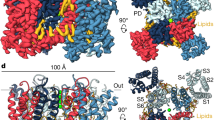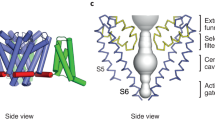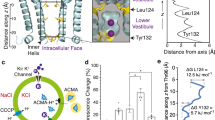Abstract
AN important feature of many excitable cells is that their permeability to ions and even to large molecules such as aldolase depends on the potential difference across the cellular membrane1. Thus, in nerve fibres a depolarization leads to a transitory increase in sodium permeability (P Na), often followed by a slower development of an increase in potassium permeability (P K). More recent studies of skeletal2,3 and cardiac (Carmeliet, E., and Weidmann, S., personal communication) muscle have demonstrated an opposite relation between P K and membrane potential that has been designated ‘anomalous rectification’. The purpose of this communication is to point out the possibility that the mechanism of these changes in permeability may be related to that recently proposed on the basis of monomolecular film studies of drugs known to affect the ionic permeability of natural membranes4–6. This mechanism is based on recently demonstrated physico-chemical principles and is susceptible to experimental test.
This is a preview of subscription content, access via your institution
Access options
Subscribe to this journal
Receive 51 print issues and online access
$199.00 per year
only $3.90 per issue
Buy this article
- Purchase on Springer Link
- Instant access to full article PDF
Prices may be subject to local taxes which are calculated during checkout
Similar content being viewed by others
References
Shanes, A. M., Pharmacol. Rev., 10, 165 (1958).
Katz, B., Arch. Sci. Physiol., 3, 285 (1949).
Hodgkin, A. L., and Horowicz, P., J. Physiol., 148, 127 (1959).
Gershfeld, N. L., and Shanes, A. M., Science, 129, 1427 (1959).
Shanes, A. M., and Gershfeld, N. L., J. Gen. Physiol., 44, 345 (1960) see also J. Physiol., 148, 57P (1959).
Shanes, A. M., Pharmacol. Rev., 10, 59 (1958).
Skou, J. C., Acta Pharm. Tox., 10, 281 (1954).
Skou, J. C., Acta Pharm Tox., 10, 325 (1954).
Skou, J. C., Biochim. Biophys. Acta, 30, 625 (1958).
Brown, G. H., and Shaw, W. G., Chem. Rev., 57, 1049 (1957).
Guastalla, J., in “Memorial des Services chimiques de I'Etat”, 41, 317 (1956–57).
Shanes, A. M., and Berman, M. D., J. Pharm. Exp. Therap., 125, 316 (1959).
Karreman, G., Cold Spring Harbor Symp. Quant. Biol., 17, 293 (1952).
Frankenhaeuser, B., and Hodgkin, A. L., J. Physiol., 137, 218 (1957).
Huxley, A. F., Ann. N.Y. Acad. Sci., 81, 221 (1959).
Fatt, P., and Katz, B., J. Physiol., 120, 171 (1953).
Koketsu, K., Cerf, J. A., and Nishi, S., J. Neurophysiol., 22, 693 (1959).
Author information
Authors and Affiliations
Rights and permissions
About this article
Cite this article
SHANES, A. Mechanism of Change in Permeability in Living Membranes. Nature 188, 1209–1210 (1960). https://doi.org/10.1038/1881209a0
Issue Date:
DOI: https://doi.org/10.1038/1881209a0
This article is cited by
Comments
By submitting a comment you agree to abide by our Terms and Community Guidelines. If you find something abusive or that does not comply with our terms or guidelines please flag it as inappropriate.



